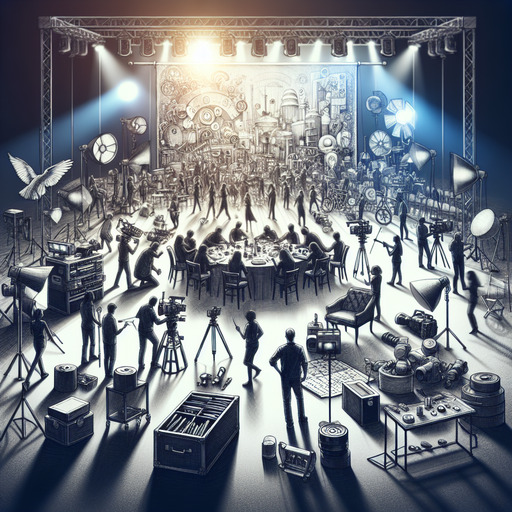
-
Table of Contents
Unlock Your Creative Potential with the Best Music Video Production Equipment! Discover the Essentials You Need to Create Stunning Visuals. Learn More
Introduction
Music video production is a dynamic and multifaceted process that requires a range of specialized equipment to bring creative visions to life. Whether you’re an aspiring filmmaker or a seasoned professional, understanding the essential tools needed for music video production is crucial for achieving high-quality results. Key equipment includes high-definition cameras for capturing crisp visuals, lighting kits to create the desired mood and atmosphere, and audio recording devices to ensure clear sound. Additionally, stabilizers and tripods are necessary for smooth, professional shots, while editing software allows for the seamless integration of footage and effects. Investing in these essential pieces of equipment can significantly enhance the production value of your music videos, making them more engaging and visually appealing.
Music Video Production Equipment: Essentials You Need
High-Quality Cameras and Lenses
The camera is the cornerstone of any music video production. High-quality cameras, such as DSLRs, mirrorless cameras, or professional cinema cameras, are essential for capturing sharp, detailed footage. While DSLRs and mirrorless cameras are more budget-friendly, cinema cameras offer superior image quality. Having a range of lenses, including wide-angle, standard, and telephoto, provides flexibility in framing and composition, ensuring a variety of shots for creative storytelling.
Lighting Equipment
Good lighting is crucial to the success of any music video. It sets the tone, highlights key elements, and enhances the overall aesthetic. Essential lighting tools include softboxes, LED panels, and ring lights. Softboxes diffuse light for a more even and flattering appearance, while LED panels allow for control over intensity and color temperature. Ring lights are perfect for close-ups, providing even illumination without harsh shadows.
Audio and Sound Equipment
Though music videos primarily focus on visuals, high-quality microphones and audio recorders are necessary for capturing any live sound or on-set dialogue. Lavalier microphones are great for capturing crisp audio from performers, while shotgun microphones are ideal for isolating specific sounds. A reliable audio recorder ensures clear sound with minimal background noise.
Stabilization Tools
To achieve smooth, professional-looking shots, stabilization tools such as tripods, gimbals, and sliders are essential. Tripods are perfect for static shots, while gimbals allow for dynamic, handheld movements with stabilized footage. Sliders offer smooth camera transitions, adding a cinematic touch to the visuals.
Post-Production and Editing Software
Post-production software like Adobe Premiere Pro, Final Cut Pro, or DaVinci Resolve brings everything together. These tools allow you to cut and arrange footage, sync it with music, and add transitions or effects. Color grading software enhances the visual tone, while Adobe After Effects can add special effects to elevate the music video further.
Q&A
1. What are the essential pieces of equipment needed for music video production?
- Camera (DSLR, mirrorless, or cinema camera)
- Lenses (wide-angle, standard, telephoto)
- Stabilization tools (tripod, gimbal, slider)
- Lighting equipment (LED panels, softboxes, reflectors)
- Microphones (for capturing live sound)
- Audio recorders (to capture high-quality audio)
- Video editing software (Adobe Premiere Pro, Final Cut Pro, or DaVinci Resolve)
- Storage solutions (external hard drives for backup)
- Special effects tools (green screen, if needed)
- Field monitor (for real-time viewing during shooting)
- Batteries and chargers (for uninterrupted shooting)
- Memory cards (high-capacity and fast read/write speeds)
- Cables and adapters (HDMI, audio, power cables)
- Props and costumes (for storytelling and concept visuals)
- Production crew (camera operators, lighting techs, etc.)
For more insights on music video production gear, check out Videomaker’s guide to essential gear.